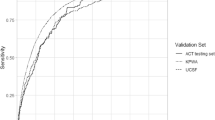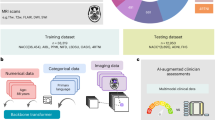Abstract
Dementia is a very serious personal, medical and social problem. Early and accurate diagnoses seem to be the key to effectively cope with it. This paper presents a diagnostic tool that couples the most widely used computerized system of cognitive tests in dementia research, the Cognitive Drug Research system, with the naive credal classifier. Although the classifier is trained on an incomplete database, it provides unmatched predictive performance and reliability. The tool also proves to be very effective in discriminating between Alzheimer’s disease and dementia with Lewy bodies, which is a problem on the frontier of research on dementia.
Preview
Unable to display preview. Download preview PDF.
Similar content being viewed by others
References
H. Allain, E. Neuman, M. Malbezin, V. Salzman, Guez D., K. Wesnes, and J. M. Gandon. Bridging study of S12024 in 53 in-patients with Alzheimer’s disease. J. Am. Geriatr. Soc., 45:125–126, 1997.
G. A. Ayre, A. Sahgal, I. G. McKeith, C. G. Ballard, K. Lowery, C. Pincock, M. P. Walker, and K. Wesnes. Distinct profiles of neuropsychological impairment in dementia with Lewy bodies and Alzheimer’s disease. Neurology. In press.
F. G. Cozman. Credal networks. Artificial Intelligence, 120:199–233, 2000.
P. Domingos. Machine learning. In W. Klosgen and J. Zytkow, editors, Handbook of data mining and knowledge discovery. Oxford University Press, New York. To appear.
P. Domingos and M. Pazzani. On the optimality of the simple Bayesian classifier under zero-one loss. Machine Learning, 29(2/3):103–130, 1997.
R. O. Duda and P. E. Hart. Pattern classification and scene analysis. Wiley, New York, 1973.
R. O. Duda, P. E. Hart, and D. G. Stork. Pattern classification. Wiley, 2001. 2nd edition.
E. Fagiuoli and M. Zaffalon. 2U: an exact interval propagation algorithm for polytrees with binary variables. Artificial Intelligence, 106(1):77–107, 1998.
T. D. Fakouhi, Jhee S. S., J. J. Sramek, C. Benes, P. Schwartz, G. Hantsburger, R. Herting, E. A. Swabb, and N. R. Cutler. Evaluation of cycloserine in the treatment of Alzheimer’s disease. J. Geriatr. Psychiatry Neurol., 8:226–230, 1995.
S. Ferris, U. Lucca, R. Mohs, B. Dubois, K. Wesnes, H. Erzigkeit, D. Geldmacher, and N. Bodick. Objective psychometric tests in clinical trials of dementia drugs. Alzheimer Disease and Associated Disorders, 11(3):34–38, 1997. Position paper from the InternationalWorking Group on Harmonisation of Dementia Drug Guidelines.
R. Kohavi, G. John, R. Long, D. Manley, and K. Pfleger. MLC++: a machine learning library in C++. In Tools with Artificial Intelligence, pages 740–743. IEEE Computer Society Press, 1994.
S. Mani, M. B. Dick, M. J. Pazzani, E. L. Teng, D. Kempler, and I. M. Taussig. Refinement of neuro-psychological tests for dementia screening in a cross cultural population using machine learning. In W. Horn, Y. Shahar, G. Lindberg, S. Andreassen, and J. Wyatt, editors, Lecture Notes in Computer Science, volume 1620, pages 326–335. Springer, 1999. Proc. of the Joint European Conference on Artificial Intelligence in Medicine and Medical Decision Making, AIMDM’99, Aalborg, Denmark.
I. McKeith, T. Del Ser, F. Spano, K. Wesnes, R. Anand, A. Cicin-Sain, R. Ferrera, and R. Spiegel. Efficacy of rivastigmine in dementia with Lewy bodies: results of a randomised placebo-controlled international study. Lancet, 356:2031–2036, 2000.
I. G. McKeith and G. A. Ayre. Consensus criteria for the clinical diagnosis of dementia with Lewy bodies. In K. Iqbal, B. Winblad, T. Nishimura, M. Takeda, and H. M. Wisnieswski, editors, Alzheimer’s Disease: Biology, Diagnosis and Therapeutics, pages 167–178. Wiley, 1997.
E. Mohr, V. Knott, M. Sampson, K. Wesnes, R. Herting, and T. Mendis. Cognitive and quantified electroencephalographic correlates of cycloserine treatment in Alzheimer’s disease. Clinical Neuropsychopharmacology, 18:23–38, 1995.
E. Mohr, D. Walker, C. Randolph, M. Sampson, and T. Mendis. The utility of clinical trial batteries in the measurement of Alzheimer’s and Huntington’s dementia. International Psychogeriatrics, 3:397–411, 1996.
C. G. Nicholl, S. Lynch, C. A. Kelly, L. White, L. Simpson, P. M. Simpson, K. Wesnes, and B. M. N. Pitt. The cognitive drug research computerised assessment system in the evaluation of early dementia — is speed of the essence? International Journal of Geriatric Psychiatry, 10:199–206, 1995.
M. Ramoni and P. Sebastiani. Robust Bayes classifiers. Artificial Intelligence, 125(1-2):209–226, 2001.
K. R. Siegfried. Pharmacodynamic and early clinical studies with velnacrine. Acta Neurol. Scand., 149(10):26–28, 1993.
P. M. Simpson, D. J. Surmon, K. A. Wesnes, and G. R. Wilcock. The cognitive drug research computerised assessment system for demented patients: a validation study. International Journal of Geriatric Psychiatry, 6:95–102, 1991.
L. Templeton, A. Barker, K. Wesnes, and D. Wilkinson. A double-blind, placebo-controlled trial of intravenous flumazenil in Alzheimer’s disease. Human Psychopharmacology, 14:239–245, 1999.
M. P. Walker, G. A. Ayre, C. H. Ashton, V. R. Marsh, K. Wesnes, E. K. Perry, J. T. O’Brien, I. G. McKeith, and C. G. Ballard. A psychophysiological investigation of fluctuating consciousness in neurodegenerative dementias. Human Psychopharmacology, 14:483–489, 1999.
M. P. Walker, G. A. Ayre, J. L. Cummings, K. Wesnes, I. G. McKeith, J. T. O’Brien, and C. G. Ballard. Quantifying fluctuation in dementia with Lewy bodies, Alzheimer’s disease and vascular dementia. Neurology, 54:1616–1625, 2000.
M. P. Walker, G. A. Ayre, J. L. Cummings, K. Wesnes, I. G. McKeith, J. T. O’Brien, and C. G. Ballard. The clinician assessment of fluctuation and the one day fluctuation assessment scale. British Journal of Psychiatry, 177:252–256, 2000.
M. P. Walker, G. A. Ayre, E. K. Perry, K. Wesnes, I. G. McKeith, M. Tovee, J. A. Edwardson, and C. G. Ballard. Quantification and characterisation of fluctuating cognition in dementia with Lewy bodies and Alzheimer’s disease. Dementia and Geriatric Cognitive Disorders, 11:327–335, 2000.
P. Walley. Statistical Reasoning with Imprecise Probabilities. Chapman and Hall, New York, 1991.
K. Wesnes. Predicting, assessing, differentiating and treating the dementias: experience in MCI and various dementias using the CDR computerised cognitive assessment system. In B. Vellas and L. J. Fitten, editors, Research and practice in Alzheimer’s disease, volume 3, pages 59–65. Serdi, Paris, 2000.
K. Wesnes, K. Hildebrand, and E. Mohr. Computerised cognitive assessment. In G. W. Wilcock, R. S. Bucks, and K. Rocked, editors, Diagnosis and management of dementia: a manual for memory disorders teams, pages 124–136. Oxford Univ. Press, Oxford, 1999.
M. Zaffalon. Exact credal treatment of missing data. Journal of Statistical Planning and Inference. To appear.
M. Zaffalon. The naive credal classifier. Journal of Statistical Planning and Inference. To appear.
M. Zaffalon. Statistical inference of the naive credal classifier. In G. de Cooman, F. Cozman, T. Fine, and S. Moral, editors, ISIPTA’01, Univ. of Gent, Belgium, 2001. The Imprecise Probabilities Project. Accepted for publication.
Author information
Authors and Affiliations
Editor information
Editors and Affiliations
Rights and permissions
Copyright information
© 2001 Springer-Verlag Berlin Heidelberg
About this paper
Cite this paper
Zaffalon, M., Wesnes, K., Petrini, O. (2001). Credal Classification for Dementia Screening. In: Quaglini, S., Barahona, P., Andreassen, S. (eds) Artificial Intelligence in Medicine. AIME 2001. Lecture Notes in Computer Science(), vol 2101. Springer, Berlin, Heidelberg. https://doi.org/10.1007/3-540-48229-6_10
Download citation
DOI: https://doi.org/10.1007/3-540-48229-6_10
Published:
Publisher Name: Springer, Berlin, Heidelberg
Print ISBN: 978-3-540-42294-5
Online ISBN: 978-3-540-48229-1
eBook Packages: Springer Book Archive




